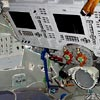
Karen Sharwood: Arrived back in Moscow last night, only to be stranded at the airport again, for the second time. Russia is a fascinating country, but I have to say trying to get in and out of here tends to be a bit of a nightmare and being stranded at the airport was not a great start. Anyway, eventually managed to get on out of there and headed back to Star City.
One of the main aims of my study is monitor heart rate and the control of heart rate on earth and during space. To do this, we will need some sort of instrument that records each heart beat, gives us the interval time between each beat and then an average of the amount of beats per minute. On earth this is really easy and there are a number of heart rate monitors that we use and that provide with this kind of data that is simple to interpret. In space, however, they use an electrocardiograph (ECG) machine that records an ECG trace onto a cassette. So my goal today was to try and figure out firstly, how to use the on-board ECG equipment, and secondly, whether this equipment provided us with the same kind of data that we are familiar with and thus we could rely on as valid and reliable data. Well, that was the goal anyway.
Dale and Karl had tried to organize some sort of baseline data collection last week while I was away back in South Africa, but unsuccessfully so. They faced a whole lot of obstacles, with the primary one being that fact that I was not there. Eventually Karl managed to set up a meeting between myself and the medical team today at 9 to collect data using both the Polar heart rate monitor and the equipment that will be used to measure heart rate on board the ISS (halter ECG). There was a matter of urgency to this as well seeing as Mark has his second 0G flight tomorrow and considering we missed out on any data last time, we were absolutely determined to getting something more meaningful and valuable this time.
Read More
|







